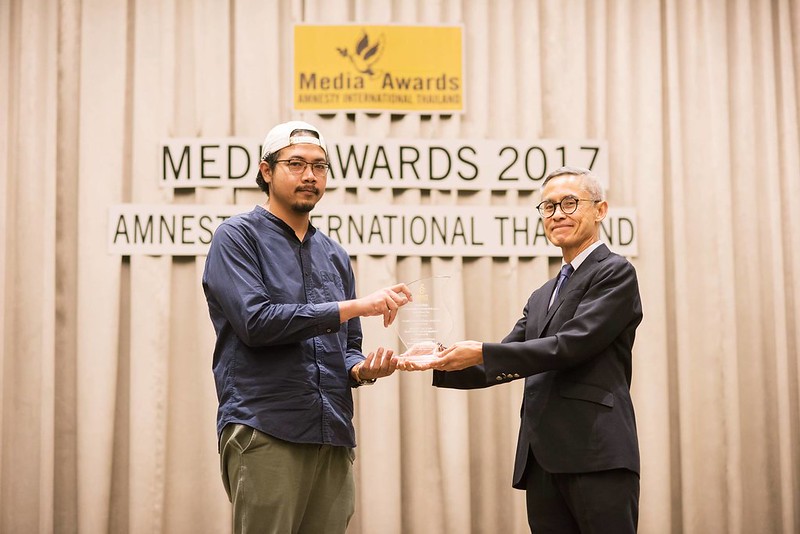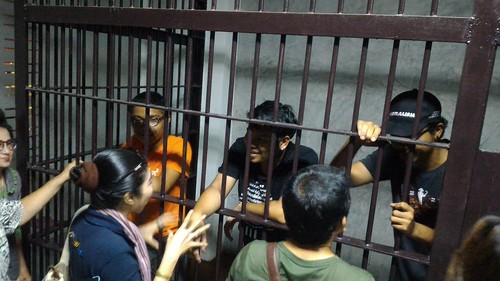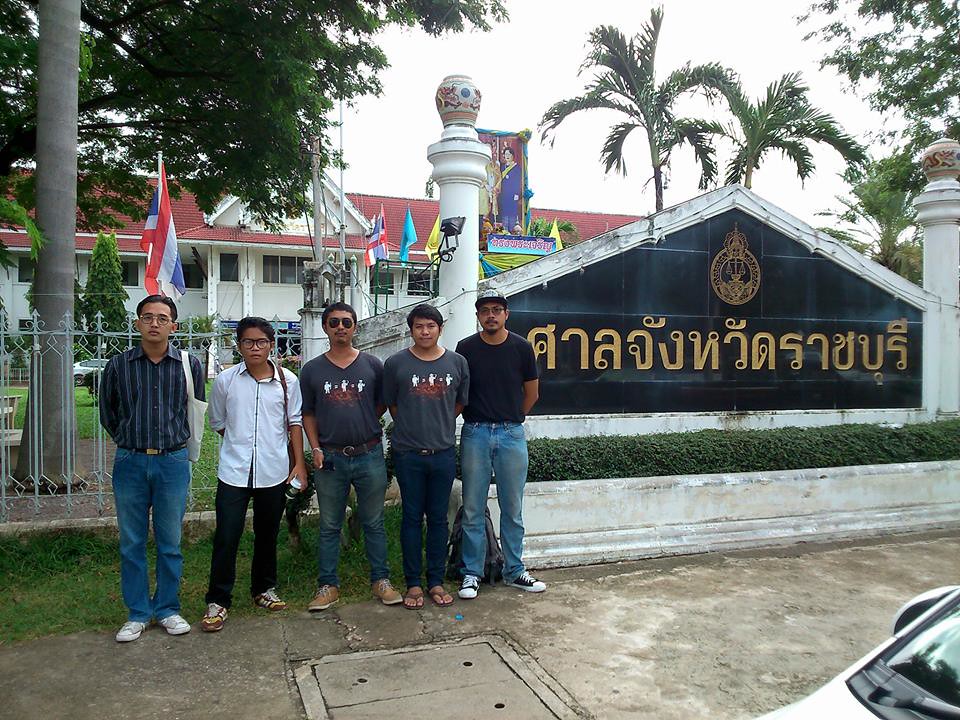It’s already been over a year since the referendum on the constitution which was approved by the majority of voters, and the memories of what happened before and after the referendum may have disappeared like the contents of a textbook; all forgotten after the test ends.
However, something very important which shouldn’t be forgotten is that a diversity public opinion could not be expressed because of various orders of the National Council for Peace and Order (NCPO). One of their measures was the arrest and prosecution of numerous people who came out to express in public their opinions concerning the draft constitution and referendum.
On 29 January, Ratchaburi Provincial Court will announce the verdict in the case of four activists and one Prachatai journalist who were accused of allegedly violating the Referendum Act by giving moral support to villagers in Ban Pong District, Ratchaburi Province in the case of the activists, and by reporting on the incident by the Prachatai journalist. Prachatai invites readers to review the proceedings of a case that has been going on for around a year, as well as the demands for a democratic referendum from organizations fighting for human rights and media freedom. This will show how the results of a referendum should not be used to question or penalize activists and journalists who are merely performing their duty under the rights that should be guaranteed for all citizens.
Prachatai journalist Taweesak Kerdpoka (left) wins the Human Rights Media Award 2017 from Amnesty International Thailand
Read his award-winning story here
Events leading to the judgement on 29 Jan 18
Thai Lawyers for Human Rights reported that on 10 July 2016, approximately one month before the referendum on the current constitution, three activists, Pakorn Areekul, Anan Loked and Anucha Rungmorakot, visited friends who had been summoned by the court. The friends were accused of violating the order that bans political gatherings of five or more persons by opening a referendum monitoring centre in Ban Pong District, Ratchaburi Province. Taweesak Kerdpoka, a Prachatai journalist, travelled in the car to report on the event.
It started when officers from Ban Pong Police Station searched Pakorn’s car. The search found documents opposing the draft constitution, ‘Vote No’ stickers and leaflets belonging to the Election Commission of Thailand (ECT) in the trunk of the car. The activists were interrogated along with the journalist; initially, police did not file charges, and only registered the case in the daily log and seized the documents.
However eventually, the police arrested the four on a charge of “together disseminating texts, images or sounds through newspapers, radio, television, electronic media or any other channel that are inconsistent with the truth or in a violent, aggressive, rude, inciting or threatening manner aimed at inducing eligible voters to refrain from voting or to choose a certain vote or to abstain from voting”, an offence under Article 61 Paragraph 2 of the 2016 Public Referendum Act.
The four accused were then detained at Ban Pong Police Station without bail, pending investigations that night. The following day (11 July 2016) at 9.00 am, police requested permission to detain them further from the Ratchaburi Provincial Court. Lawyers from Thai Lawyers for Human Rights filed a complaint against their detention. Taweesak tried to explain to officers numerous times before being detained that he was only a journalist hitching a ride to report an incident, and had no part in distributing the documents. However, authorities saw that the four of them had come together, so they filed charges against all of them. On 12 July 2016 police arrived at the Prachatai office with a search warrant to search for and confiscate anything related to “vote no” campaigns, but nothing was found. Taweesak revealed to Thai Lawyers for Human Rights that police officers tried to implicate Prachatai in the case by claiming it was a sponsor and printer of documents used in the Vote No campaign for the New Democracy Movement.
Later on the same day, four carloads of police surrounded the house of Phanuwat Songsawadchai, at that time a student at the Faculty of Political Science at Maejo University, Phrae Campus. He is one of the alleged offenders who had reported to Ban Pong Police Station in the morning on charges of holding an event at the opening of a referendum monitoring centre. He had the same charges filed against him as the four other accused.
Despite demands from numerous organisations to drop charges against the four activists and one reporter, they were not withdrawn. The alleged violation of the Referendum Act continues according to the legal process.
The defendant’s statement – assures stickers not inciting
Taweesak talked about the case in a general overview. He faces two charges; 1) violating the Referendum Act by distributing Vote No stickers, and 2) violating Order No. 24 of the Council for Democratic Reform under the Constitutional Monarchy (CDRM) for refusing to give his fingerprints during police interrogation. He has confessed to the second charge, testifying that his reason was that he did not accept the arrest process.
Taweesak responded to the accusation concerning the Referendum Act with two points. First, he travelled to Ban Pong Police Station on 10 July 2016 merely in connection with his work as a journalist, and not to participate in the referendum campaign in any way. And secondly, campaigning on the referendum is not illegal since the Act speaks of statements that “are inconsistent with the truth” or made “in a violent, aggressive, rude, inciting or threatening manner ”. Therefore referendum campaigns which do not contain such statements are not unlawful.
Taweesak (right) stayed a night behind the bar after he was arrested with other four activists.
On 3 October 2017 in testimony on this case, Pakorn said that during the constitutional referendum he saw that campaigns providing knowledge on the pros of the 2017 constitution were not well-known or extensively disseminated in the media. The information that the public received consisted only of the main points. There were people who didn’t even know the date of the referendum itself.
Pakorn views that the message in the sticker “Vote No for a future we didn’t choose” is not a violent, aggressive, rude, inciting or threatening message. With respect to the additional question attached to the referendum concerning whether members of the Senate and the House of Representatives should be allowed to select the Prime Minister for the first five years, Pakorn is of the opinion that because senators may not be chosen by election, this becomes “a future we didn’t choose” as the stickers illustrate.
Pakorn testified that Commissioner Somchai Srisuthiyakorn of the Election Commission of Thailand (ECT) had said in an interview that distributing stickers shouldn’t violate the Referendum Act and Wissanu Krea-ngam, a Deputy Prime Minister, also said in an interview that the New Democratic Movement’s dissenting documents could also be disseminated and people may express agreement or disagreement on the draft constitution.
On the same day, Taweesak testified as a witness that on the day of the incident he had followed the activists to Ban Pong Police Station as a journalist after learning that the alleged offenders in the referendum monitoring centre case had been summoned to hear the charges. Before the incident, he had done a news report on Pakorn at Thammasat University, and Pakorn told him that he was heading to Ban Pong Police Station to give moral support to the people there. Taweesak then asked for a ride. Once they arrived at the Station, he began taking pictures and interviewing the alleged offenders, before interviewing the third and fifth defendants to write the news story.
Taweesak testified that afterwards, the authorities invited them to the police station, although he had declared himself a journalist from the very start, also showing them his journalist ID card. Also, when he was summoned, police did not say that it was to make an arrest, but once he was at the station, officers announced the charges and apprehended him.
Taweesak also testified that at first he was allowed to use a phone, so he called Somchai of the ECT to interview him about the stickers. Somchai stated that having stickers shouldn’t be a violation of the law and if it’s not making speeches or giving false information and provoking or inciting others then it’s alright; however, it’s also up to the discretion of the police. Then Taweesak handed the phone to the Deputy Superintendent for Inquiries at Ban Pong Police Station.
Taweesak added that when he presented himself as a Prachatai journalist, police may not have believed him since Prachatai is an online news agency without a printing house. Police may have thought that the seized documents belonged to Prachatai, since after Taweesak was summoned, Pol Lt Col Sarayut Buriwachira contacted Sutthisan Police Station. Police from that station then searched the news agency; however there was nobody there that day, so police did not enter the premises. Prachatai knew that the police had come since other agencies in the same building informed them.
Panuwat, Anan, Pakorn, Anucha and Taweesak stands in front of Ratchaburi Court
Other Referendum Cases
Threats against freedom of expression during the referendum campaign started approximately with the preparations to open referendum monitoring centres in various provinces headed by the United Front for Democracy Against Dictatorship (UDD). The actions taken ranged from summoning campaigners to military camps for talks to filing charges. In particular, 19 core UDD members were charged with violating NCPO Head Order No. 7/2015; the prohibition of any political gathering of more than five people, as a result of a press conference to launch a referendum monitoring centre at Imperial World Lat Phrao on 5 June 2016. This case is still proceeding in the military court. Meanwhile, alleged offenders in other cases facing the same charges in other provinces have either been summoned to attitude adjustment sessions or prosecuted. For example, in Sakon Nakhon, the court ruled that taking a photo with a referendum monitoring centre poster was a violation of NCPO Head Order No. 3/2015, and the offenders were given sentences of a 1 month and 15 days in prison and fines of 2,500 baht with the prison term suspended for 1 year of after all 20 defendants confessed.
A report by the International Federation for Human Rights or FIDH stated that the authorities increased the number of arrests and charges in the period before the referendum from 27 April to 24 July 2016. The authorities arbitrarily detained at least 41 people for criticizing or campaigning against the draft constitution, including at least 38 core members of the UDD, who were detained for their attempts to establish referendum monitoring centres.
On 23 June 2016, activists from the New Democracy Movement (NDM), Ramkhamhaeng University and Triumph Labour Union, a total of 13 people, were detained by military and police officers at the Bangplee Industrial Estate, Samut Prakan Province, for distributing leaflets and documents providing information on the draft constitution and referendum. They were later charged with violating NCPO Head Order No. 3/2015 for holding a political gathering of more than five people; the case is still before the military court.
Even well-known politician Watana Muangsook was also taken to a military camp for attitude adjustment after a Facebook post about voting no on the draft constitution. He then made another post, “No matter how many times you take me to adjust my attitude, I’ll still vote no on this draft constitution”. Afterwards, Watana was charged with violating NCPO Announcement No. 39/2014 on the conditions of release for persons summoned by the NCPO.
On the day of the referendum, Piyarat ‘Toto’ Chongthep or tore up his ballot paper in protest against the referendum. He and his friends, Jirawat Aekakkaranuwat and Thongtham Kaewpanpruek, who recorded the incident, were charged with causing a disturbance and public disorder, but the charges were dismissed by the court. But Piyarat was charged with destroying a government document and causing damage to public property. He was sentenced to 4 months’ imprisonment and a fine of 4,000 baht. Because he pleaded guilty and had no prior criminal record, the sentence was reduced to 2 months’ imprisonment suspended for one year and a fine of 2,000 baht.
Some public events were blocked by the police, reflecting pressure through the law. The Internet Law Reform Dialogue (iLaw) reported that an event and constitution campaign activities arranged by the Referendum Websites Network in February 2016 had to be cancelled after the military and police contacted the Bangkok Art and Culture Centre where the event was to be held.
Many organizations questioned the legitimacy of the referendum when the media and the people were restricted by the Referendum Act
Taweesak has informed Prachatai that the court has allowed him to fight fairly and that there is nothing to worry about; he personally believes he has done nothing wrong and is pleased to prove himself according to the judicial process. However, charges filed by the authorities against the mass media have created ripples in the media and human rights organisations.
The Foreign Correspondents Club of Thailand expressed concern about the arrest of Taweesak and said that the charge set an alarming precedent for media freedom in Thailand. “It is not unusual for journalists to accompany or travel with newsmakers and interviewees. As a reporter covering human and environmental rights, Mr Taweesak was merely doing his job,” stated the FCCT.
Brad Adams, Asia director at Human Rights Watch, said “arresting peaceful activists is bad enough, but jailing a journalist for reporting on the ‘vote-no’ campaign is a serious blow to press freedom in Thailand and any hopes that the vote on the constitution will be a fair one.”
Benjamin Ismaïl, the head of the Asia-Pacific desk of Reporters Without Borders stated “It is unacceptable that local officials, acting under the junta’s authority, fail to distinguish between political activists and a journalist who is covering their activities.”
“As if violating the fundamental freedoms of assembly and opinion were not enough, the authorities are compounding their crimes by also violating freedom of information and media freedom. What will come next? Arresting the journalists who cover these arbitrary arrests?
The government must tolerate the media reporting of the critical views of opposition,” said Ismaïl.
Pramed Lekpetch, Vice President for Rights and Freedom and Media Reform of the Thai Journalists Association and Supan Rakchuea, Vice President for Rights and Freedom of the Thai Broadcast Journalists Association, have similar views on this case. They demand that the Prachatai journalist be released without charge because the authorities cannot claim that a journalist riding together with activists is unlawful; it is normal for journalists to head to their destinations on time, and it’s not unusual for journalists to find it necessary to travel together with others involved in the event. At the same time, journalists must perform their duties in line with principles of liberty and rights as well as take responsibility for presenting news according to the constitution.
Kulchada Chaipipat, Mass Media Liberty and Rights Manager of the Southeast Asia Press Alliance (SEAPA), said that the arrest of the journalist and activists is excessive and unreasonable. The identification card matter is another issue, but since he was in the area to collect information from a witness, and the facts confirm that this journalist has been following the referendum campaign from the start, there should be no reason for the arrest.
Kulchada also said that what has happened reflects how Article 61 Clause 2 of the Referendum Act has a direct effect on the media, especially in this case where charges were filed. The journalist should be released without condition since he was only performing his duty as a media professional. Expressing personal opinions is also his right; the arrest was groundless.
Mana Treelayapewat, Dean of the Faculty of Communication Arts at the University of the Thai Chamber of Commerce, said that the arrest of Taweesak reflects how society and Thai police still don’t see alternative media as a journalism, and even though at present there has been a great increase in alternative media and civilians who can present news by themselves and are professional in their work, these media cannot receive any protection.
From a not fair not free referendum to election credibility
Under the limited freedom of expression enforced by the junta government and forecasts of an election in 2017 or early 2018 if the draft constitution passed, international human rights and media freedom organizations criticized the enforcement of the law and NCPO orders to suppress those that oppose the draft constitution and demanded the release of people charged under these laws .
Shawn Crispin, the Southeast Asia representative of the Committee to Protect Journalists (CPJ) not only proposed that the Thai junta government clear Taweesak of the charges immediately, but also sees it as contradictory that Taweesak was arrested on charges relating to the referendum while the country was heading towards an election. If the Thai junta government wants this election to be credible, they should drop all charges and stop all threats towards the media. "If Thailand is truly on a path back to democracy, as the junta claims, then it should lift its various bans on critical news reporting and allow journalists to resume their democratic role of checking and balancing government and military officials," said Crispin.
Similarly, Ravina Shamdasani, spokesperson for the UN High Commissioner for Human Rights, held a press conference on 19 August 2016 expressing concerns about the continuously increasing restrictions on democracy, as well as demanding that the nation immediately stop filing charges against political activists and human rights defenders, including those imprisoned for opposing views towards the draft constitution; these measures are critically necessary for Thailand to move forward towards an election in 2017 [now delayed until 2018 or 2019] with the aim of bringing democracy back, according to the junta government’s roadmap.




